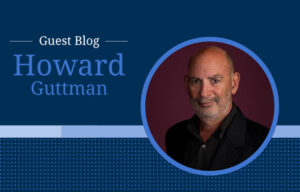Conflict Management: Are You Being Aggressive or Assertive?
By Howard Guttman | March 15, 2023
Actions have consequences. How you behave and communicate throughout your organization can have a significant ripple effect on your co-workers, team members, and even the larger organization. The Guttman Behavioral Continuum provides a range of options for meeting your needs. Here are some questions that we raise in our Accel5 video that are well worth pondering: Are you at the end of the continuum where you typically come across as non-assertive? At the other extreme, do others view you as aggressive? Or do your colleagues see you in the middle, as assertive?
Knowing where you’re situated on the continuum is critical to your success. This is especially true in today’s environment, where influencing others is crucial. It takes a finely tuned radar to enroll people as partners in meeting your needs, especially when engaging in difficult conversations. Without it, if you’re non-assertive you’re likely to be ignored, and if you’re aggressive you’ll no doubt leave a trail of victims—or enemies—in your wake.
Here’s the challenge: How accurate is your sense of self? Do you know whether or not your self-perception of your impact on others is accurate? How aware are you of situations in which you cross the line with others, especially when there are difficult issues to resolve? In my experience working in organizations of all sizes and types, a wide gap often yawns between self-perception and reality.
What if you could “test drive” the effect you have on others before “going live” to state your case to colleagues? That would undoubtedly raise your batting average for getting your proposals accepted or having your point of view given serious air time.
Begin by understanding the three behaviors on the Guttman Behavioral Continuum: what they are and the relative payoffs of each. Then, increase your self-awareness of how you come across naturally on the Continuum when working with others to resolve issues. Without this understanding, it’s unlikely that you‘ll be able to shift your behavior.
Conflict Resolution: Are You Being Aggressive or Assertive? is designed to raise your EQ and equip you with the tools to home in on the optimal mode for resolving issues. You’ll come away with a better feel for how to show up powerfully when resolving tough issues and decisions while preserving healthy business relationships. After all, this is what we all get paid to do: press the envelope for an optimal outcome and promote teamwork.
Incidentally, it’s equally important for teams to assess where they show up on the Guttman Behavioral Continuum. Many low-EQ teams sabotage their ability to gain closure on issues. They can employ the same tools as individuals to assess and raise their performance.
The most successful executives and managers we know tend to avoid behavioral extremes. They know that the further they are toward either end, the more likely it is that they’ll self-sabotage. Learn to be assertive and you’ll increase the likelihood of getting what you need and the support of your colleagues in getting it.
Howard M. Guttman is principal of Guttman Development Strategies, a Mt. Arlington, NJ leadership and organization development firm specializing in building high-performance teams, organizational alignment, executive coaching, and leadership development. (guttmandev.com). He is the author of When Goliaths Clash; Great Business Teams; and Coach Yourself Win.

Howard Guttman is founder and principal of Guttman Development Strategies, Inc., a management consulting firm that builds high-performance teams and coaches executives to realize their own and their organizations’ potential. Leadership Excellence magazine has named him one of its “Excellence 100 Top Thought Leaders.”

